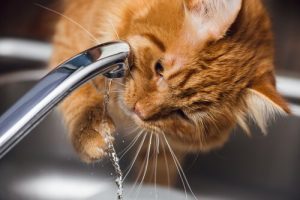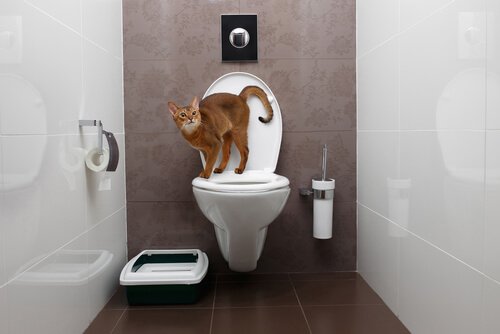Renal Problems in Cats: symptoms and treatment


Written and verified by the vet Eugenio Fernández Suárez
Renal problems in cats are quite common, especially in geriatric animals over seven years old. As of that age, it’s common for a cat’s kidney to not work as well as before. Therefore, it’s crucial to visit the vet more often in order to diagnose any of these problems early.
Renal Problems in Cats
Although only a veterinarian should diagnose and treat these diseases, it’s important for owners to know the symptoms of renal problems in cats. That way they can take their cats to the veterinarian upon noticing any symptoms.
Besides the liver, the kidneys are the main organs that eliminate toxins in the blood. However, they also play a key role in regulating the water levels in the body. So, these organs are very important in the entire dehydration processes.

Most Common Symptoms
Renal problems in cats can develop in several ways. One of the most common is the appearance of polyuria and polydipsia. These are two terms veterinarians use that mean an increase in the volume of water intake and urine production, that leads to urinating more frequently.
The loss of weight or appetite should always be something a cat owner should look out for. Also, it’s an important reason to visit the veterinarian, along with behavioral changes such as apathy or lethargy. Although these symptoms may be common to many diseases, when they appear along with changes in the frequency and consistency of urine, then possibly a cat has developed a renal problem.
Other common symptoms of renal problems in cats are vomiting and dehydration. You can check the latter by pinching your cat’s skin and observing how long it takes to return back to its place. If it takes more than a second, it may mean your pet is dehydrated.

Treatment
Renal problems in cats have several causes. However, renal disease in cats is kidney failure in older cats. Normally, treatment focuses on the symptoms due to the kidneys being at their limit and they must maintain their function.
Treatment for renal problems in cats is based on their diet, mainly because they are highly dehydrated. Their kidneys don’t collect the urine well, and they remove a lot of liquid along with it. Therefore, they should have a diet based on a high liquid content by using wet canned food, even though cats don’t drink much water.
The protein content of the diet is also important because the urea production is altered. Therefore, you must reduce your cat’s protein intake and incorporate high-quality ones because protein is vital for cats. So, veterinarians should always make these diets, even if they look similar to a diet recommended for dogs with kidney failure.
Supplements: renal problems in cats
Phosphorus must be regulated. It should not be concentrated, or the veterinarian should supply phosphorus chelators. You can also consider potassium supplements, along with regulating hypertension in cats.
You should also treat possible vomiting with antiemetics or even with vasodilators, which provide several benefits for improving your cat’s renal function.
Usually, kidney problems in cats are chronic diseases that should be treated during the animal’s entire life to prevent from getting worse. This will allow your cat to live a long life, and will often simply mean paying close attention to their diet. However, cats must be correctly diagnosed and analyzed periodically. Hence, the importance of going to the vet more often for older animals.
Renal problems in cats are quite common, especially in geriatric animals over seven years old. As of that age, it’s common for a cat’s kidney to not work as well as before. Therefore, it’s crucial to visit the vet more often in order to diagnose any of these problems early.
Renal Problems in Cats
Although only a veterinarian should diagnose and treat these diseases, it’s important for owners to know the symptoms of renal problems in cats. That way they can take their cats to the veterinarian upon noticing any symptoms.
Besides the liver, the kidneys are the main organs that eliminate toxins in the blood. However, they also play a key role in regulating the water levels in the body. So, these organs are very important in the entire dehydration processes.

Most Common Symptoms
Renal problems in cats can develop in several ways. One of the most common is the appearance of polyuria and polydipsia. These are two terms veterinarians use that mean an increase in the volume of water intake and urine production, that leads to urinating more frequently.
The loss of weight or appetite should always be something a cat owner should look out for. Also, it’s an important reason to visit the veterinarian, along with behavioral changes such as apathy or lethargy. Although these symptoms may be common to many diseases, when they appear along with changes in the frequency and consistency of urine, then possibly a cat has developed a renal problem.
Other common symptoms of renal problems in cats are vomiting and dehydration. You can check the latter by pinching your cat’s skin and observing how long it takes to return back to its place. If it takes more than a second, it may mean your pet is dehydrated.

Treatment
Renal problems in cats have several causes. However, renal disease in cats is kidney failure in older cats. Normally, treatment focuses on the symptoms due to the kidneys being at their limit and they must maintain their function.
Treatment for renal problems in cats is based on their diet, mainly because they are highly dehydrated. Their kidneys don’t collect the urine well, and they remove a lot of liquid along with it. Therefore, they should have a diet based on a high liquid content by using wet canned food, even though cats don’t drink much water.
The protein content of the diet is also important because the urea production is altered. Therefore, you must reduce your cat’s protein intake and incorporate high-quality ones because protein is vital for cats. So, veterinarians should always make these diets, even if they look similar to a diet recommended for dogs with kidney failure.
Supplements: renal problems in cats
Phosphorus must be regulated. It should not be concentrated, or the veterinarian should supply phosphorus chelators. You can also consider potassium supplements, along with regulating hypertension in cats.
You should also treat possible vomiting with antiemetics or even with vasodilators, which provide several benefits for improving your cat’s renal function.
Usually, kidney problems in cats are chronic diseases that should be treated during the animal’s entire life to prevent from getting worse. This will allow your cat to live a long life, and will often simply mean paying close attention to their diet. However, cats must be correctly diagnosed and analyzed periodically. Hence, the importance of going to the vet more often for older animals.
This text is provided for informational purposes only and does not replace consultation with a professional. If in doubt, consult your specialist.








